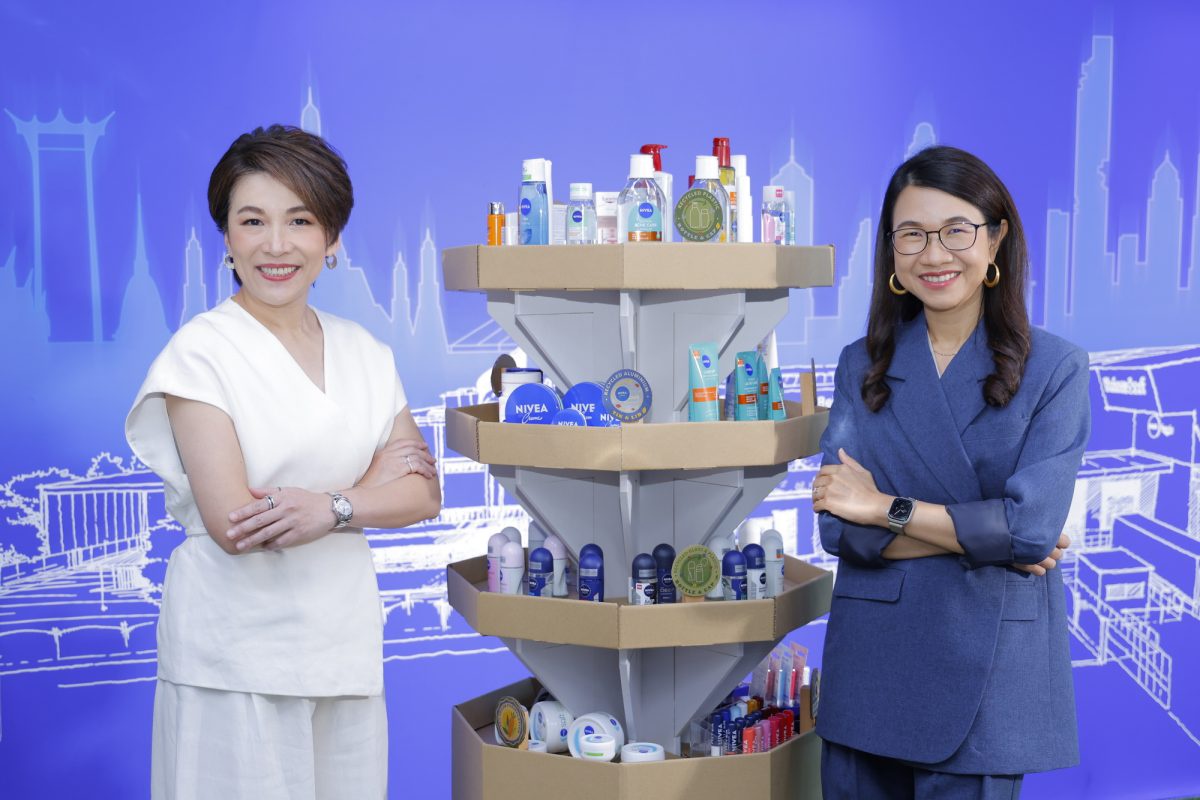Beiersdorf was established in Germany by Paul Beiersdorf, who pioneered modern medical plasters in 1882. In 1890, Dr. Oscar Troplowitz became the creator and driving force behind the success of popular products like NIVEA Cream, as known as NIVEA Cream Blue tin, including NIVEA SUN, Eucerin Lotion and NIVEA DEO. NIVEA Cream was first introduced to Thailand in 1926 before Beiersdorf Thailand was founded in 1972 and established its manufacturing facility in 1987. Since then, the company has evolved into a key production hub for Beiersdorf in Asia, actively contributing to Beiersdorf's global sustainability goals by implementing eco-friendly operations across the supply chain.
Beiersdorf is dedicated to driving sustainable change not only within its business but throughout the entire value chain. Through ongoing innovation in product and packaging design, the company reduces environmental impact while ensuring the use of renewable energy and responsibly sourced materials. Furthermore, Beiersdorf engage with local communities, fostering social responsibility through initiatives that create careers and support sustainable livelihoods. The company's commitment to an inclusive society, focusing on the empowerment of women, children, and youth, reflects its core value of "Care."
Ms. Waraporn Likhitchanyakul, General Manager of Beiersdorf Thailand, stated, "At Beiersdorf, we prioritize sustainability in every aspect of our business, aligning with our global brand purpose, Care Beyond Skin. Our latest business strategy, 'Win with Care,' is designed to deliver positive impacts on consumers, the environment, and society through our skincare products. We are committed to continuously improving not only the quality of our products but also how we source our materials, operate transparently, and support our communities."
The Production Center of Beiersdorf Thailand serves as a key manufacturing hub for Beiersdorf in Asia, actively aligning its operations with the company's sustainability strategy. The facility has implemented effective waste disposal and treatment processes, minimizing environmental impact. Recently, it launched a solar farm spanning 5,610 square meters (14 rais), generating 100% green energy with a peak capacity of 999 kilowatts (kWp). Beiersdorf continues to innovate in sustainable packaging, utilizing eco-friendly plastics and biodegradable materials. Since 2021, all NIVEA products have been 100% microplastics-free, and its sunscreen products are free from reef-harming substances. The company aims to reduce greenhouse gas emissions by 30% by 2025, achieve carbon neutrality by 2030, and reduce emissions by 90% by 2045.
Ms. Surakha Wanphen, Production Center Director, Beiersdorf Thailand said, "To achieve long-term sustainable transformation, we work closely with our partners across our supply chain, focusing on reducing carbon emissions at every stage. We can make our products more sustainable by selecting raw materials and production processes that reduce carbon dioxide (CO2) emissions. For example, using closer or shorter delivery routes, as well as choosing recycled materials instead of virgin plastic, all contribute to reducing emissions. Recently, we launched the largest solar farm compared with Beiersdorf's globally. Currently, we generate 25% from solar energy, with 10% coming directly from the solar farm. This initiative will reduce carbon dioxide (CO2) emissions by up to 800 tons per year, equivalent to the absorption of 50,000 trees. Furthermore, we are actively promoting sustainability awareness among our employees and fostering a culture of sustainability within our operations."
In addition to its environmental initiatives, Beiersdorf sides with equality and diversity within its organization, achieving a 50:50 gender ratio in leadership roles as of 2023. Through its global "Care Beyond Skin Day" initiative, Beiersdorf employees around the world contribute to society by participating in projects that enhance education and public health. The company's commitment to social responsibility is reflected in efforts such as improving libraries in underprivileged schools in Thailand.
Since 2011, Beiersdorf has consistently implemented integrated CSR projects and activities, including the use of renewable energy, the development of eco-friendly packaging, and the rehabilitation of the environment and our forests to be a sustainable source of raw materials. We also have projects to improve the quality of life and education for women and young in the local communities that we source raw materials from, and where our production facilities are around the world. Moving forward, Beiersdorf remains committed to developing new initiatives that will create a positive impact on society and foster sustainable change.
Source: Spark Communications
